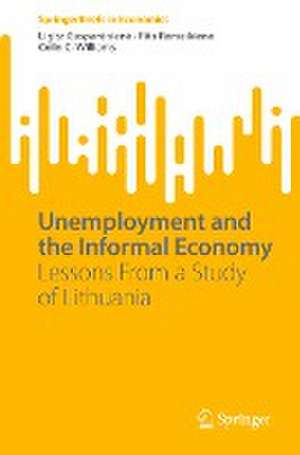Unemployment and the Informal Economy: Lessons From a Study of Lithuania: SpringerBriefs in Economics
Autor Ligita Gasparėnienė, Rita Remeikienė, Colin C. Williamsen Limba Engleză Paperback – 7 mai 2022
Din seria SpringerBriefs in Economics
-
 Preț: 444.35 lei
Preț: 444.35 lei -
 Preț: 264.79 lei
Preț: 264.79 lei - 15%
 Preț: 462.51 lei
Preț: 462.51 lei -
 Preț: 47.33 lei
Preț: 47.33 lei -
 Preț: 353.14 lei
Preț: 353.14 lei -
 Preț: 273.32 lei
Preț: 273.32 lei -
 Preț: 376.04 lei
Preț: 376.04 lei -
 Preț: 379.09 lei
Preț: 379.09 lei -
 Preț: 380.07 lei
Preț: 380.07 lei -
 Preț: 377.35 lei
Preț: 377.35 lei -
 Preț: 379.09 lei
Preț: 379.09 lei -
 Preț: 376.59 lei
Preț: 376.59 lei -
 Preț: 408.27 lei
Preț: 408.27 lei -
 Preț: 379.09 lei
Preț: 379.09 lei -
 Preț: 383.27 lei
Preț: 383.27 lei -
 Preț: 378.54 lei
Preț: 378.54 lei -
 Preț: 377.95 lei
Preț: 377.95 lei -
 Preț: 340.23 lei
Preț: 340.23 lei -
 Preț: 380.25 lei
Preț: 380.25 lei -
 Preț: 378.12 lei
Preț: 378.12 lei -
 Preț: 376.04 lei
Preț: 376.04 lei -
 Preț: 376.04 lei
Preț: 376.04 lei -
 Preț: 379.68 lei
Preț: 379.68 lei -
 Preț: 381.00 lei
Preț: 381.00 lei -
 Preț: 375.23 lei
Preț: 375.23 lei -
 Preț: 376.80 lei
Preț: 376.80 lei -
 Preț: 378.54 lei
Preț: 378.54 lei -
 Preț: 377.57 lei
Preț: 377.57 lei -
 Preț: 376.04 lei
Preț: 376.04 lei -
 Preț: 378.92 lei
Preț: 378.92 lei -
 Preț: 375.62 lei
Preț: 375.62 lei -
 Preț: 379.09 lei
Preț: 379.09 lei -
 Preț: 353.67 lei
Preț: 353.67 lei -
 Preț: 342.14 lei
Preț: 342.14 lei -
 Preț: 375.45 lei
Preț: 375.45 lei -
 Preț: 379.09 lei
Preț: 379.09 lei -
 Preț: 377.35 lei
Preț: 377.35 lei -
 Preț: 344.86 lei
Preț: 344.86 lei -
 Preț: 377.35 lei
Preț: 377.35 lei -
 Preț: 345.89 lei
Preț: 345.89 lei -
 Preț: 377.57 lei
Preț: 377.57 lei -
 Preț: 343.83 lei
Preț: 343.83 lei -
 Preț: 378.12 lei
Preț: 378.12 lei -
 Preț: 345.06 lei
Preț: 345.06 lei -
 Preț: 379.48 lei
Preț: 379.48 lei -
 Preț: 379.48 lei
Preț: 379.48 lei -
 Preț: 380.07 lei
Preț: 380.07 lei -
 Preț: 375.45 lei
Preț: 375.45 lei -
 Preț: 445.33 lei
Preț: 445.33 lei -
 Preț: 378.54 lei
Preț: 378.54 lei
Preț: 411.16 lei
Nou
Puncte Express: 617
Preț estimativ în valută:
78.69€ • 81.53$ • 65.67£
78.69€ • 81.53$ • 65.67£
Carte tipărită la comandă
Livrare economică 22 martie-05 aprilie
Preluare comenzi: 021 569.72.76
Specificații
ISBN-13: 9783030966867
ISBN-10: 3030966860
Pagini: 111
Ilustrații: VIII, 111 p. 181 illus., 146 illus. in color.
Dimensiuni: 155 x 235 mm
Greutate: 0.18 kg
Ediția:1st ed. 2022
Editura: Springer International Publishing
Colecția Springer
Seria SpringerBriefs in Economics
Locul publicării:Cham, Switzerland
ISBN-10: 3030966860
Pagini: 111
Ilustrații: VIII, 111 p. 181 illus., 146 illus. in color.
Dimensiuni: 155 x 235 mm
Greutate: 0.18 kg
Ediția:1st ed. 2022
Editura: Springer International Publishing
Colecția Springer
Seria SpringerBriefs in Economics
Locul publicării:Cham, Switzerland
Cuprins
1. Introduction.- 2. Theorizing the informal economy.- 3. Relationship between unemployment and the informal economy in Lithuania.- 4. Conclusions and recommendations.
Notă biografică
Ligita Gasparėnienė is Head of Science and Innovation Department, Vilnius University, Law Faculty (Lithuania). She holds a PhD in economics from Kaunas University of Technology and a Master of Law from Vilnius University. Her research focuses on different aspects of the shadow economy.
Rita Remeikienė is Head of the Project Department, Vilnius University, Faculty of Law, (Lithuania). She holds a PhD in economics and a masters in marketing management from Kaunas University of Technology. Her research interests are shadow economy, unemployment, self-employment, and the labor market.
Colin C Williams is Professor of Public Policy at the School of Management at University of Sheffield (UK). He has a PhD in Urban and Regional Studies from the University of Birmingham. He is the Lead Expert on undeclared work to European Commission’s European Platform Tackling Undeclared Work. His particular research interest is in studying the magnitude and character of the informal economy and evaluating different public policy approaches and initiatives for tackling this sphere.
Rita Remeikienė is Head of the Project Department, Vilnius University, Faculty of Law, (Lithuania). She holds a PhD in economics and a masters in marketing management from Kaunas University of Technology. Her research interests are shadow economy, unemployment, self-employment, and the labor market.
Colin C Williams is Professor of Public Policy at the School of Management at University of Sheffield (UK). He has a PhD in Urban and Regional Studies from the University of Birmingham. He is the Lead Expert on undeclared work to European Commission’s European Platform Tackling Undeclared Work. His particular research interest is in studying the magnitude and character of the informal economy and evaluating different public policy approaches and initiatives for tackling this sphere.
Textul de pe ultima copertă
This Brief examines the dynamics between the informal economy and unemployment rates, the causes of informality, its consequences and potential reduction measures at both the theoretical and empirical level. Using Lithuania as a case study, this book tests the assumption that participation in the informal economy is largely by the unemployed in emerging economies. Chapters present a systematic and comparative literature analysis, a quantitative survey of participation in the Lithuanian informal economy, especially among the unemployed, an expert evaluation involving representatives of municipalities in charge of the issues of employment, and a statistical analysis of the results. Challenging traditional narratives around the informal economy, this Brief is targeted at academic and postgraduate researchers studying labor economics, public economics, human resource management, industrial relations, and economic sociology.
Caracteristici
Examines the dynamics between the informal economy and unemployment rates Provides empirical research on participants in the informal economy in Lithuania Challenges the view that it is solely the unemployed who engage in the informal economy
